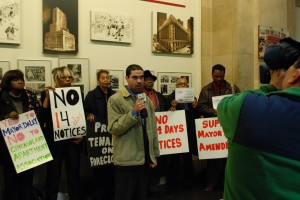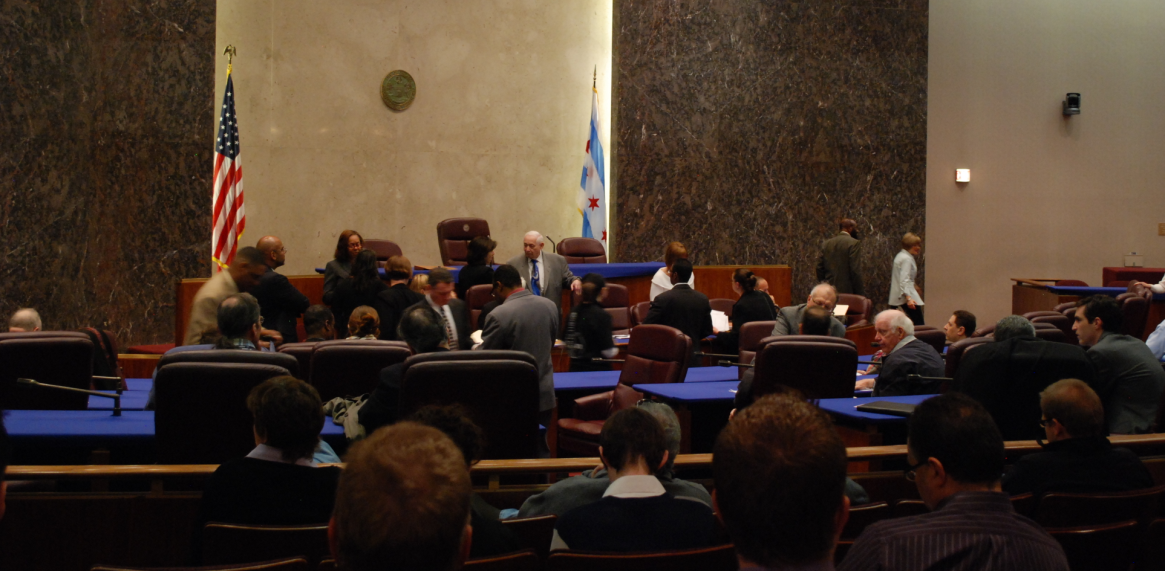For Marietta Murphy, the pastoral setting of Princeton Park seemed like the perfect place to raise her five daughters. They could have the freedom to ride their bikes, and she could have a garden. And rents at the South Side housing complex were affordable.
But nine years later, each of her girls suffers from respiratory problems, including asthma and recurring bronchitis, requiring constant treatment. Murphy blames pervasive mold in her townhome – and a landlord who has done nothing about repeated flooding.
Standing water pools in the basement and mold permeates the air in her home. Walls bubble from water damage, and lead chips falls from windows and door frames onto porches and into gardens. Tenants are living in unsanitary and hazardous conditions while Preston Higgins Jr, the development’s owner, rakes in millions.
Princeton Park tenants are organizing to improve conditions, and they’ve filed a class-action lawsuit against Higgins over mold and lead issues – and violations of Chicago’s landlord tenant ordinance.
Built in the 1940s, the Princeton Park Homes complex occupies a six-square block stretch of land west of the Dan Ryan between 91st and 95th Streets. A century ago, this was a rural area populated by Dutch settlers who cultivated the land for farming. As African Americans migrated north and Chicago grew, the racial fabric of the neighborhood changed, and the new residents needed affordable housing options.
Princeton Park Homes were built to house black middle-class railroad workers and their families. Today the complex is still almost entirely African American, filled with working families that pay market-rate rent.
The development maintains much of its original appeal. Inside Princeton Park the city’s grid system is abandoned for curving streets and cul-de-sacs, and front lawns of townhomes are well manicured. Princeton Park’s website boasts of the impressive gardens and fosters a healthy competition among residents vying for an annual garden and lawn award.
Princeton Park residents take pride in their yards, but their sense of well-being stops at the front door. Residents report widespread problems with basement flooding and leaky windows and walls that cause mold to grow and ruin their belongings. Children test positive for lead poisoning. Rodents and insect infestations are plentiful.
Lakisha Jones, a single mother of two who’s lived in Princeton Park for two years, suffered six floods in just over a year. A two-foot-high water line marks the height of the most recent flood in her basement. Jones lost baby books and winter clothes, and she’s had to replace a washer – and then purchase a new $400 motor for the new washer after yet another flood.
And after her home was flooded with water contaminated by feces and decaying animals, she and her 9-year old son contracted bacterial infections that sent them to the hospital with oozing sores and fevers.
Today she doesn’t take any chances – industrial-strength bleach is a regular purchase and is used to combat the mold that creeps up walls and drips from her ceiling. Each time it rains, Jones is nervous and checks each wall and window for signs of flooding.
“I feel like a hurricane victim, having water run down my walls,” she said. She’s complained to the management office numerous times, but “Princeton Park has failed to fix any of the safe and unsanitary conditions inside the property.”
In their lawsuit, tenants charge that Princeton Park owners pass the cost of maintenance and repairs on to tenants in violation of Chicago’s Residential Landlord-Tenant Ordinance.
Under the ordinance, landlords are responsible for maintenance unless damage is caused by tenants; charges for general wear and tear should not be passed on the tenants. But the lease at Princeton Park states that “Lessee must make his own repairs… at Lessee’s expense.”
It’s not for lack of money, with rents for nearly a thousand two- and three- bedroom units ranging from $650 to $800 a month, the owner takes in as much as $750,000 each month. According to Dun & Bradstreet, Preston Higgins & Co. nets $1.9 million in profits each year.
Tenants charge that Princeton Park has turned the development’s hazardous conditions into money-making opportunities while allowing the buildings to slowly deteriorate. In addition to their monthly rent, Princeton Park tenants pay for all repair and maintenance visits and all outside contractors. Additional fees range from $5 to unstop a toilet to $45 to clean grease traps, and even more for security doors, wiring, or piping. Tenants end up bearing the lion’s share of the financial burden for apartment condition and repair requests.
A year or so into her residency, Marietta Murphy’s kitchen sink needed repairs. The aging plumbing system was overburdened and regularly flooded. Princeton Park charged her for each maintenance visit.
“I have no idea how much extra they have charged me because its tacked onto the rent each month, and with additional fees and yearly rent increases, it’s hard to keep track of,” she said.
In addition to paying maintenance visits each time flooding occurred, Murphy has lost three washers and dryers and a deep freezer in her nine years at Princeton Park. The owners don’t really care, she said. ”The office told me there was nothing they could do and that I shouldn’t put anything of value in the basement,” she said. ”They told me I should get renters insurance.”
Murphy points out several vacant homes where tenants voiced complaints to the management office and to Higgins to no avail. ”You better believe Higgins is not living like we are living out here,” she said. ”And if he were to come out here and live one month in the summer with the floods, he’d move out of here.”
The city has fined Preston Higgins LLC and Princeton Park LLC several times for code violations regarding flooding as well as noncompliance with lead abatement. But for Higgins, as for many landlords, such fines seem to be considered a cost of doing business.
Tenants want the city to do more. They’re meeting regularly with the Metropolitan Tenant Organizations and pressing city officials to help deal with the basement flooding proactively.
At a recent tenant meeting, several residents expressed concern about steps management has taken toward lead abatement. When door frames in a majority of the townhomes were found to contain lead, maintenance workers tacked aluminum strips to cover the lead paint. But tenants say the strips are flimsy and often fall off.
Tenants say they wish Higgins would work with them to improve their living situation. They love Princeton park for what it could be – a safe, pleasant and affordable neighborhood that fosters community. But they feel like they are investing in Preston Higgins rather than their community.
“I strongly believe that if Mr. Higgins would meet with this tenants once a month that this could be a much better place,” said Murphy. ”Our rent is helping him go to Hawaii, buy luxury cars, and go to those five-star restaurants. Without us, he would be having White Castle and McDonald’s like we do.”
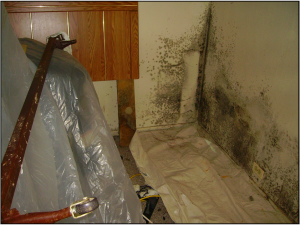
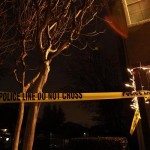


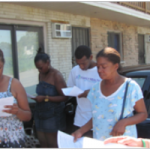
 Good morning, my name is Ms. Patricia Hightower. I am a resident of Chicago, Illinois, and I live in a senior building on the southeast side of Chicago. I am also a member of the Metropolitan Tenants Organization.
Good morning, my name is Ms. Patricia Hightower. I am a resident of Chicago, Illinois, and I live in a senior building on the southeast side of Chicago. I am also a member of the Metropolitan Tenants Organization.

